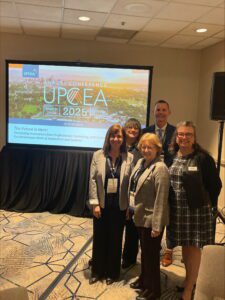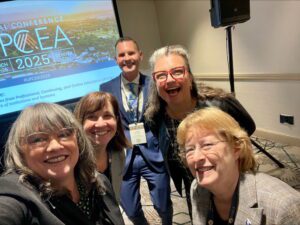Annual Conference Follow Up: Translating PCOE Innovation into the Future of Higher Education
In an era of heightened urgency, higher education institutions find themselves at a pivotal crossroads—confronting enrollment cliffs, shifting demographics, and growing skepticism about the value of a degree. Further, shifting federal policy and changes at the Department of Education will challenge postsecondary leaders like never before. Amid this turbulence, one area consistently demonstrates adaptability, innovation, and a clear-eyed view of the modern learner: professional, continuing, and online education (PCOE).
At the #UPCEA2025 session titled “The Future is Here: Translating Innovations From Online and Professional Education Into the Mainstream of Institutions and Systems,” a panel of PCOE leaders—Jenni Murphy, Vickie Cook, Jason Ruckert, and Lisa Templeton—gathered to share how their units and their unique personal talents are now central to institutional survival and success. With Julie Uranis moderating, the conversation moved beyond inspiration, offering blueprints for action.

PCOE Leaders as Institutional Change Agents
What makes PCOE leaders so valuable beyond their units? According to the panel, it’s their entrepreneurial mindset, strategic agility, cross-functional know-how, and relentless focus on student needs. These qualities positioned them to lead during crises—from pandemic-related chaos to structural enrollment declines. Each panelist offered real-world examples of leading enrollment management overhauls, system-wide restructuring, and digital transformation, all rooted in their PCOE experience.
With the short tenure of most institutional presidents and provosts, Uranis observed that longtime employees such as the four panelists, each having around two decades of employment at their institutions, were known commodities at their institutions. For new presidents and provosts hoping to be a catalyst for change, these trusted leaders could legitimize decisions and assist in the change management process. In essence, senior PCOE leaders have what new leaders lack, institutional history and knowledge of the organization.
But perhaps most importantly, they embody a cultural competency that higher education often overlooks: understanding the modern learner. Today’s learners are adults with jobs, caretaking responsibilities, and shifting career goals. They’re not just looking for education—they’re looking for flexibility, relevance, and ROI.
From Silos to Systems: Breaking Barriers to Innovation
Despite the successes, scaling PCOE innovations is far from frictionless. Institutional inertia, siloed structures, risk-averse cultures, and outdated financial models remain formidable obstacles. The panel offered strategies to address these barriers, from leveraging UPCEA’s Hallmarks of Excellence to aligning innovation efforts with institutional mission and metrics. Change, they emphasized, starts with trust, over-communication, and building psychologically safe environments for collaboration.
Online Education & Credentials: The New Academic Frontier
Online education is no longer an add-on. It’s an expectation. And the panelists underscored how their institutions are pushing even further—into micro-credentials, stackable pathways, and corporate partnerships that reflect real workforce needs. At institutions like Oregon State and UIS, these innovations are already reshaping access and learner experience. For institutions still catching up, the focus is on laying the groundwork for sustainable, scalable, future-proof transformation.
Access, Equity, and the Modern Learner
The session didn’t shy away from the equity conversation. PCOE units have long served those who fall outside the traditional student mold—returning adults, rural learners, international students, and others often rendered invisible by traditional metrics. As Lisa Templeton noted, today’s learners—regardless of age—prioritize flexibility, affordability, and career outcomes. It’s up to institutions to meet them where they are.
This vision was perhaps best captured by Jenni Murphy’s assertion: “If you can’t see them, you can’t serve them.” That ethos runs through everything PCOE units do—from CRM implementations to statewide policy partnerships aimed at creating “adult-ready” and “adult-friendly” designations.
 A Call to Action
A Call to Action
The future of higher education is already unfolding in PCOE units. They are not on the margins; they are the test labs, the bridge builders, and increasingly, the architects of institutional resilience and relevance.
Now is the time to stop asking whether PCOE leaders and units belong at the core of our institutions—and to start building systems that recognize what they already are.
By Jenni Murphy, Dean of the College of Continuing Education at California State University, Sacramento; Vickie Cook, Vice Chancellor for Enrollment and Retention Management at the University of Illinois Springfield; Jason Ruckert, Senior Vice President for Enrollment Management, Marketing & Student Affairs at Embry-Riddle Aeronautical University; Lisa Templeton, Vice Provost for the Division of Educational Ventures at Oregon State University; and Julie Uranis, Senior Vice President for Online and Strategic Initiatives at UPCEA.
Other UPCEA Updates + Blogs
UPCEA Congratulates Members Recognized in the 2026 U.S. News & World Report Ranking of Best Online Bachelor’s Programs
Nineteen of the twenty-three Top 20 Ranked Institutions are UPCEA Members WASHINGTON, D.C. (February 5, 2026) — UPCEA, the online…
New Research Highlights a Disconnect Between University Retention Strategies and Adult Learner Priorities
National study from Collegis Education and UPCEA highlights opportunity for institutions to strengthen student persistence through better alignment of strategy,…


